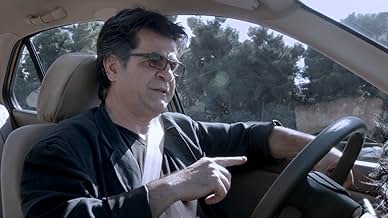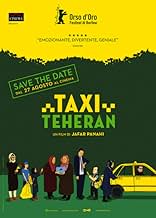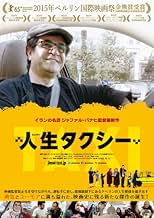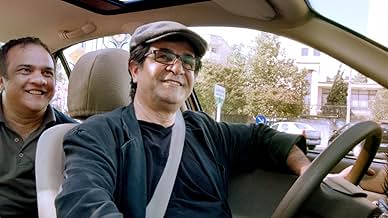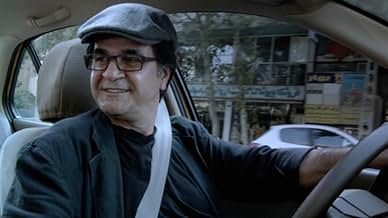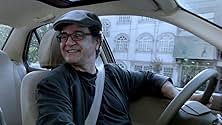El gobierno iraní le prohíbe a Jafar Panahi hacer películas, y se hace pasar por taxista para rodar una sobre los desafíos sociales en Irán.El gobierno iraní le prohíbe a Jafar Panahi hacer películas, y se hace pasar por taxista para rodar una sobre los desafíos sociales en Irán.El gobierno iraní le prohíbe a Jafar Panahi hacer películas, y se hace pasar por taxista para rodar una sobre los desafíos sociales en Irán.
- Dirección
- Guionista
- Elenco
- Premios
- 8 premios ganados y 8 nominaciones en total
- Dirección
- Guionista
- Todo el elenco y el equipo
- Producción, taquilla y más en IMDbPro
Opiniones destacadas
In Tehran Taxi, Panahi masquerades as a taxi driver and picks up a range of curious passengers throughout Tehran; from a couple of old ladies nursing a goldfish in a bowl, a mugger, a flower seller and a traffic accident victim.
It's an unusual style, but one made familiar by dash-cams across the world and both the subject matter and style of interlocking stories reminded me of Jim Jarmush's 1991 film 'Night on Earth'.
Panahi isn't a comedian, but his style is lighthearted. The fact he is a film maker rather than a real taxi driver also means that he doesn't know many directions around the city and he further bemuses passengers when he refuses to take payment at the end of the ride. Equally though film paints an interesting picture of the everyday lives of the passengers and the buzz of the city going on on the streets of Tehran outside of the taxi's window.
Tehran Taxi is an excellent film. Sit back and enjoy the ride!
Filmed via a number of small cameras, some fixed within the taxi itself, some carried around by other protagonists, the story sees Panahi acting as a cab driver and encountering pieces of the Iranian Weltanschauung. The irony of his position is highlighted as his first passenger criticizes his geographical orientation, noticing that something must have gone seriously wrong for Panahi in order for him to have to resort to something he has no clue about. And after a short argument between passengers about whether stealing the wheels off a car should warrant the death penalty or not, "just to send a message", you get the sense of how easily people become desensitized to such matters if only they are faced with them frequently enough. Paradoxically, the man suggesting this course of action is a "freelancer" himself, but more of a Robin Hood mold, which apparently should exempt him from a similar punishment.
This contradiction between wrong and right is explored throughout the journey, as Panahi encounters a series of colourful characters: a man selling pirated international films (who actually recognizes the director and takes quick advantage of him), a woman weeping over her dying husband, two older women fighting for their lives, an old neighbour who had recently been the victim of a robbery, a woman suffering a similar fate of marginalization due to the her political views, and Panahi's niece, who is just being introduced to what "publishable films" are in Iran.
Panahi strikes a fine balance between some more comical aspects of Iranian life and the very dire need for self expression, that is severely limited. The humanism that pervades Taxi poses the same question repeatedly: what causes crime and who is a criminal within Iranian society? Drawing from a well of personal experience, he manages to create an endearing context for all his protagonists and their tales and it feels like he is taking us by the hand and guiding us, not so much physically, as emotionally. His smile spreads these emotional cues, from affection to sympathy, confusion and intense discomfort, and this gives off the sensation of being joined by a friend throughout this journey.
The worst that can be said is that the scripting of events does occasionally feel a bit heavy handed, in order to condense all the experience in what is ultimately a very short film. And while generally avoiding the lure of leaning too heavily on caricature, it ends on a slightly underwhelming artistic note.
But those are all the complaints I have to make. I very much enjoyed Taxi and gathering from the vibe around me, so did many of the other people watching it. While I feel the focus should generally be on the art, more than on the artist, here's hoping that Panahi will have the chance to one day echo the affection he receives and generates in festival venues around the world, by having the freedom to openly appear alongside Iranian artists and their uncensored visions.
A highly emotionally satisfying miniature. On the surface it feels small and funny, but underneath it is seething in anger and defiance at the Iranian government. One of the stuff that makes the movie so unusual is that it is so difficult to pinpoint whether everything is planned or caught in the spur of the moment. Especially the final scene which kept my mind wondering. I really like this a lot. More so when I found out about the sad state of affairs for Jafar Panahi. He is actually banned from making movies for 20 years because he was deemed to have crossed the "sordid realism" line drawn by the Iranian government. How he subtly pokes fun at the authorities is hilarious and yet warm. The whole 80+ min film feels like a window into another world, a world not unlike ours, especially when Eric Khoo's most recent film is deemed "unscreenable". One of the most important films I have seen this year. Now I feel like hunting down The White Balloon, Closed Curtains and This Is Not a Film.
'Taxi Teheran' is filmed with a dash cam. It shows Panahi as a taxi driver in Teheran, talking with his passengers, and discussing the hot political topics in Iran he is not allowed to touch upon. His passengers talk about the death penalty, about political prisoners, about the male-centred inheritance laws, or about Ghoncheh Ghavami, the woman who got a prison sentence for attending a volleyball game.
Panahi cleverly links the political issues to real-life situations, such as the wish of a of a motorcycle accident victim, to have his last will and testament filmed with a smart-phone, before he passes away. The film is far from boring and has some funny moments. It's all done in a documentary style, without any artificial cinematographic additions. Still, everything is staged, and some camera movements and cuts make clear that Panahi is a professional director.
Unfortunately, just its being made in a stealth mode doesn't mean 'Taxi Teheran' is a terrific film. It largely depends on the dash cam-gimmick, which wears off after a half hour or so. The story itself is too meager to carry the whole film, and some of the taxi passengers are just not interesting enough to grab the viewer's attention.
Panahi assumes the guise of a taxi driver (apparently a nod to fellow Iranian director Abbas Kiarostami's film, "Ten") and drives around a city, much like any other city, picking up various passengers throughout the day. There are moments of hilarity as Pahani deals with one situation after another, but underneath it all is a telling story of what life is like in Iran today, with particular attention to issues of censorship, state sanctioned brutality, women's rights, and of course, how this affects the arts and culture. It makes light of life in Iran and pokes fun at the powers that be, all the while recognizing that their actions have serious ramifications.
It is for the most part an engaging film, but given that it all takes place in a taxi and as such, is almost completely driven by dialog, it can drag a little. Still, for what it is, a piece of political theater, it is really excellent. If you get a chance to see it, I'd recommend it if for no other reason than to get a small feel for a country we, in the Western world, get to see so little of.
¿Sabías que…?
- TriviaShortly after the film's premiere at Berlin was announced, Jafar Panahi released an official statement in which he promised to continue making films despite the ban and said, "Nothing can prevent me from making films since when being pushed to the ultimate corners I connect with my inner-self and, in such private spaces, despite all limitations, the necessity to create becomes even more of an urge."
- Citas
Nasrin Sotoudeh: They work in a way that let us to know they are watching us.Their tactics are obvious.First, they write you up a police record. Suddenly, you are accused of being an agent for Mossad, The CIA, or MI6. Then they tack on something about your morals, your lifestyle. They make your life into a prison.Although you are released from prison, but the outside world is only a bigger prison.They make your nearest friends into your worst enemies.After that you think all you can do is either leave the country or pray to return to that hole. So i think it's better to let it go.
- ConexionesReferenced in Film Junk Podcast: Episode 547: The Revenant and Best of 2015 (2016)
Selecciones populares
- How long is Taxi?Con tecnología de Alexa
Detalles
Taquilla
- Total en EE. UU. y Canadá
- USD 321,642
- Fin de semana de estreno en EE. UU. y Canadá
- USD 22,531
- 4 oct 2015
- Total a nivel mundial
- USD 3,906,227
- Tiempo de ejecución1 hora 22 minutos
- Color
- Mezcla de sonido


